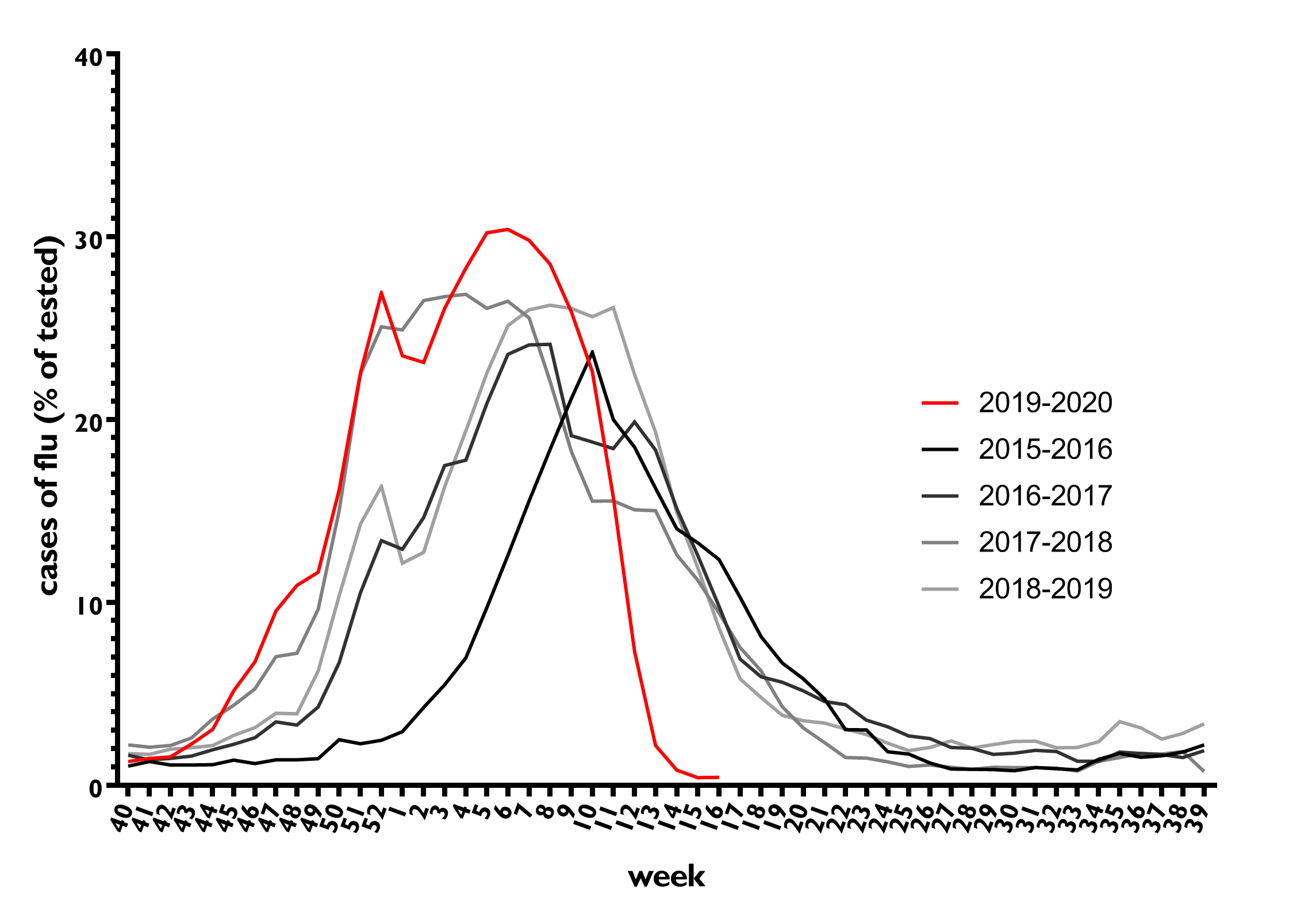

CLAIM
“ZERO flu deaths and ZERO pneumonia deaths for the first time in history”

DETAILS
Factually inaccurate: The claim states that there have been zero cases of flu in 2020, directly contradicting data generated by hospitals and clinical laboratories, which are collected and reported by the U.S. Centers for Disease Control and Prevention.
KEY TAKE AWAY

The flu is a seasonal disease that begins during winter and generally peaks around February in the Northern Hemisphere. Based on statistics reported by the U.S. Centers for Disease Control and Prevention (CDC), the number of flu cases during the 2019-2020 season have been similar to at least the previous six years, as reported by clinical laboratories that conduct the testing. The rising numbers of COVID-19 cases and deaths do not reflect misidentification of flu cases and flu-related deaths, as suggested.
FULL CLAIM: “So let me get this straight … there are ZERO flu cases and ZERO pneumonia deaths for the first time in history? How is that possible?”
SUMMARY
A Facebook post recently propagated the claim that there are “ZERO flu deaths and ZERO pneumonia deaths for the first time in history”. Given the current context of the COVID-19 pandemic, this statement could be interpreted by some people to mean that flu cases and flu-related deaths are being mislabeled as COVID-19 cases and deaths in order to inflate the magnitude of the pandemic.
This claim is inaccurate: as of 27 April 2020, the U.S. Centers for Disease Control and Prevention (CDC) reported an estimated 39 to 56 million cases of flu in the U.S. during the 2019-2020 flu season. During the same period, flu accounted for 24,000 to 62,000 deaths in the country. Compared with previous years, the number of deaths during the 2019-2020 flu season is similar (see Figure 1 below). The 2017-2018 season was particularly deadly, but the ongoing 2019-2020 flu season currently ranks second highest in terms of number of deaths. This is confirmed by other statistics provided by the U.S. CDC including the cumulative number of hospitalizations, which represents the number of patients with laboratory-confirmed flu infections who were admitted to a hospital. These data also clearly show that 2020 has not been spared by the flu, as the number of individuals hospitalized with flu rose steadily during the first two months of the year.

The global number of laboratory-confirmed flu cases in 2020 also directly contradicts the claim. The number of flu cases detected by clinical laboratories peaked between the 6th and 8th week of 2020 before decreasing (see Figure 2). This peak is expected because flu is a seasonal disease, peaking in winter and almost disappearing in the summer. Data since 1982 indicates that the number of flu cases typically peaks in February in the Northern Hemisphere. A comparison of the number of detected flu cases this year to previous flu seasons clearly shows that 2020 is absolutely comparable to previous years. Therefore, it is inaccurate to claim that there have been no flu cases in 2020.

Interestingly, the number of newly-detected flu cases declined much earlier in the year than previous seasons—in March 2020. This phenomenon was also observed in Singapore and is therefore not limited to the U.S. Researchers from the Saw Swee Hock School of Public Health at the National University of Singapore have suggested that the prophylactic measures taken to curb the spread of SARS-CoV-2, such as masks and social distancing, have also contributed to a milder flu season[1].
In summary, clinical laboratories did record cases of flu and flu-related deaths during the 2019-2020 season. In terms of both laboratory-confirmed cases and number of deaths, the current flu season is comparable to previous years. It is therefore inaccurate to claim that there have been zero cases of flu.
While it is not explicitly stated in the Facebook post, such a claim can be interpreted by some people to mean that cases of flu and flu-related deaths have been misidentified as SARS-CoV-2 to artificially inflate the number of COVID-19 cases and related deaths. However, the data from the CDC for the 2019-2020 flu season, beginning in October 2019, demonstrates that the magnitude of the flu season has not been downplayed.
In addition, comparisons of overall mortality in 2020—that is the number of deaths from all causes—with past years demonstrates that 2020 is seeing an unusual increase in the number of deaths in most countries hit by COVID-19. This further confirms that the cases and mortality attributed to COVID-19 is not due to a mislabeling of “normal” flu cases.
REFERENCES
- 1 – Soo et al. (2020) Decreased Influenza Incidence under COVID-19 Control Measures, Singapore. Emerging Infectious Diseases.
NIP Web Desk Team
News Info Park Web Desk Team brings live updates of news from all around the World and provides quality information 24*7.






